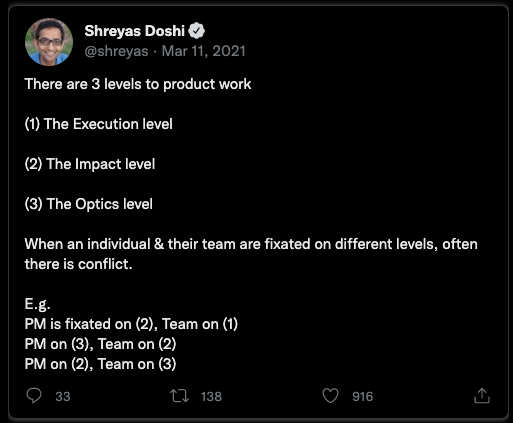i love the way ideas collide on twitter.
Ted Gioia wrote about sophistry in his newsletter and it clarified something in the impact/execution/optics framework that Shreyas Doshi talks about:
it's not about moral judgements (impact = good, optics = bad)
it's about what the PM values
Sophistry is set of skills focused on persuasion (i.e. rhetoric), developing these skills is a reflection of underlying values (and an environment that supports those values).
As someone develops those skills, certain qualities will follow. As Ted Gioia points out:
Despite the shallowness of their thinking, sophists have far more influence than honest and serious thinkers, especially in matters of politics and policy. This is because the sophist’s rhetoric is always shaped by what their audience wants to hear.
- A focus on optics = the PM is closer to a sophist (values persuasion)
- A focus on impact = the PM is closer to a philosopher (values truth)
- A focus on execution = the PM is closer to a pragmatist (values realism)
The 💡 is that none of these are inherently good or bad, they are about what you value. Reading through these you might thing one is better or worse than the others (i certainly did writing them), but that is a reflection of your (my) values.
And once I understand what people (and organizations) value and what skills that causes them to develop, I can study the consequences of what emphasizing those values and skills are.
Some examples of qualities of sophists from Ted's newsletter:
Some examples of qualities of sophists from Ted's newsletter:
- Sophists will avoid painful truths that run counter to popular demand. Addressing hard truths is bad for their business.
- Sophists are frequently deceivers and sometimes outright charlatans, whose goal is to make people believe whatever they want—and thus, according to Plato and Aristotle, they are responsible for a large portion of the public holding false beliefs.
- If necessary, a sophist can actually argue both sides of any issue—and thus has the skill to make the bad seem good, or evil look like justice.
- They are often aligned with the rich and powerful, and have a knack for making money from their abilities.
- In the words of one classicist, the end result is a powerful group of influencers (as we would call them today) who are “crudely self-serving” and “frivolously manipulative.”
- Yet the sophists remain popular despite all these obvious warning signs. That’s no coincidence, because the sophists practice a vocation that deliberately aims at enriching and empowering the possessor of sophistical skills.

